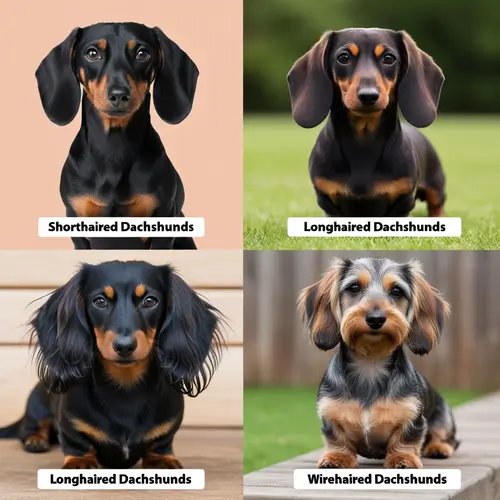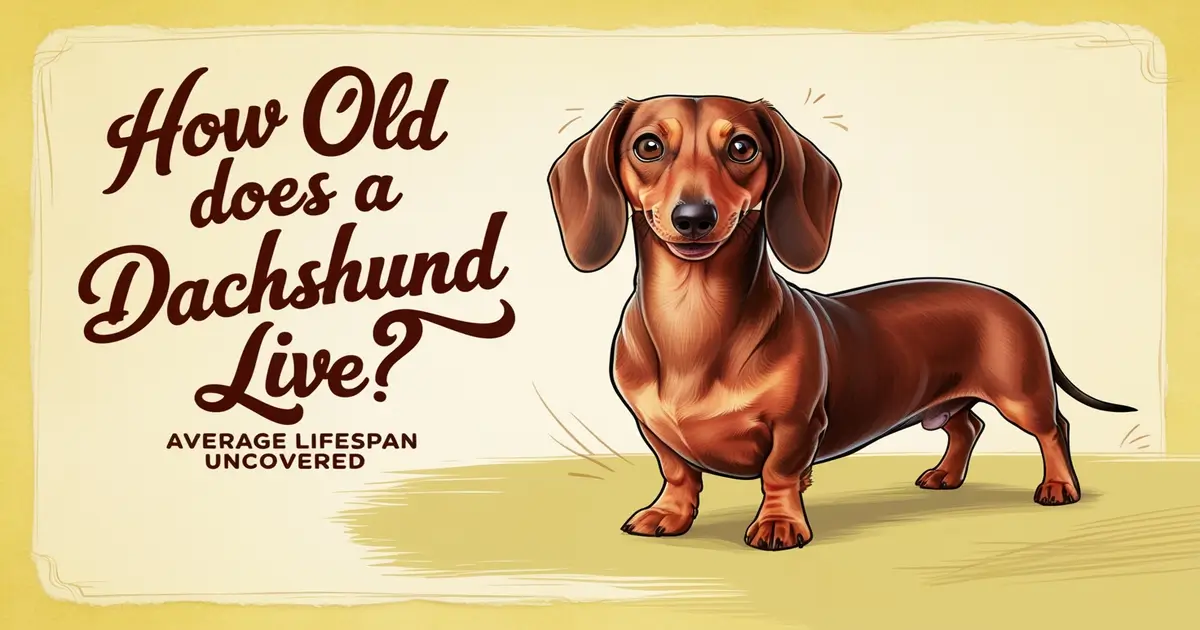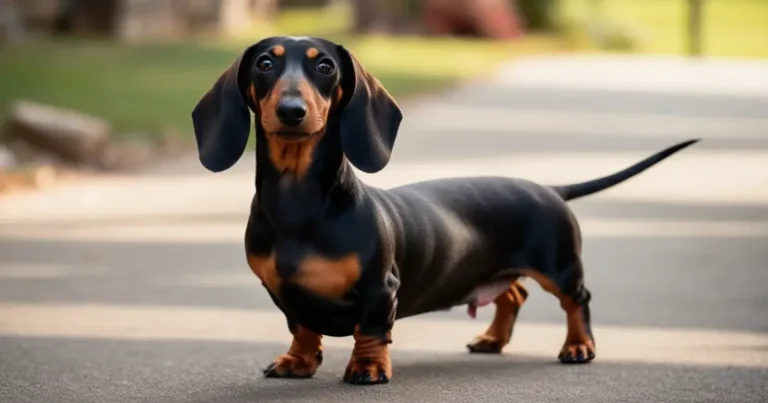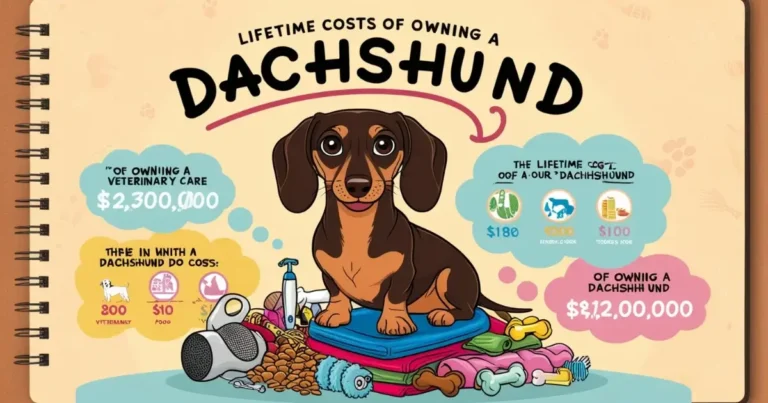How Old Does a Dachshund Live? Average Lifespan Uncovered
Dachshunds are popular dogs with their unique look and loyal personality. But when choosing a Dachshund, it’s natural to ask, how old does a Dachshund live? Knowing a pet’s life expectancy is important, so you can plan for many wonderful years together. In this guide, we’ll explore the Dachshund lifespan based on research data, including factors that influence their age and what you can do to keep them healthy.
Table of Contents
What is the Average Lifespan of a Dachshund?
Dachshunds, like other dog breeds, have an average lifespan based on data collected by researchers. On average, Dachshunds live between 12 and 15 years, which is a bit longer than many other breeds. Some Dachshunds live even longer, reaching 18 or more years. With the right care, a Dachshund can stay healthy well into their senior years.

Lifespan Differences: Standard vs. Miniature Dachshunds
Dachshunds come in two main sizes: Standard and Miniature. Each type has its own average lifespan, though both sizes have the potential to live long lives.
Standard Dachshunds
On average, Standard Dachshunds live between 11 and 14 years. While they have a similar life expectancy to Miniatures, Standard Dachshunds can be a bit more resilient. Different coat types—long, smooth, and wire—exist in Standard Dachshunds, and some studies suggest that wirehaired and longhaired types may be less prone to back issues compared to smooth-coated Dachshunds.
Miniature Dachshunds
Miniature Dachshunds have a lifespan of 10 to 15 years. Data shows that Miniatures may have a slightly shorter average lifespan because they tend to develop IVDD more frequently than Standards. This condition affects their backs and requires careful handling to prevent injury. Despite this challenge, with good care, Miniature Dachshunds can live just as long as Standards.
| Dachshund Type | Average Lifespan | Notes |
| Standard Dachshund | 11 – 14 years | Larger size; slightly lower risk of back issues compared to Miniatures. |
| Miniature Dachshund | 10 – 15 years | Higher risk of IVDD, which can impact lifespan. Good care can support a longer life. |
| Shorthaired Dachshund | 12 – 15 years | Low-maintenance coat; no specific health issues related to coat type. |
| Longhaired Dachshund | 12 – 15 years | Requires regular grooming; otherwise, no unique health concerns affecting lifespan. |
| Wirehaired Dachshund | 12 – 15 years | Known for being sturdy; generally healthy with no coat-related lifespan impact. |
| Record-Breaking Dachshunds | 21 – 25 years | Some exceptional Dachshunds, like Chanel and Rocky, have reached 21+ years. |
Coat Types and Lifespan: Do They Make a Difference?
Dachshunds also come in different coat types, which can add some variety to their looks but not necessarily their lifespan. Let’s look at each one briefly.

Shorthaired Dachshunds
Shorthaired Dachshunds have smooth coats that are easy to maintain. This coat type is not linked to any special health issues, making them a popular choice.
Longhaired Dachshunds
Longhaired Dachshunds are beautiful with their flowing coats. While their coat doesn’t affect lifespan, it does require regular grooming. Taking care of their coat also keeps their skin healthy.
Wirehaired Dachshunds
Wirehaired Dachshunds have a rugged, coarse coat. They’re often described as sturdy and resilient. Like the other coat types, they can live long lives with good care.
Factors Influencing How old does a Dachshund live
When it comes to how old does a Dachshund live, many factors come into play. Let’s look at the main influences:
Exercise and Physical Activity
Dachshunds benefit from regular exercise. These dogs love to move around, and exercise helps keep them at a healthy weight. This is important since Dachshunds, with their long backs and short legs, are prone to back issues if they get too heavy. Daily walks and gentle play are great ways to support a Dachshund’s health.
Diet and Nutrition
Good nutrition is a must for a long life. Feeding a balanced diet, free of excess fats and sugars, helps keep your Dachshund healthy. Quality dog food that includes necessary nutrients supports their overall well-being. Overfeeding can lead to obesity, which adds stress to their back and joints, so sticking to healthy portions is essential.
Genetics and Family History
Genetics play a significant role in how old does a Dachshund live. Some Dachshunds inherit conditions that can impact their lifespan, like Intervertebral Disc Disease (IVDD). Knowing about any genetic conditions from a breeder or vet can help in planning a healthy life for your dog.
Common Health Issues Affecting Lifespan
Dachshunds are generally healthy dogs, but there are specific health concerns to be aware of if you want to understand how old does a Dachshund live.
Intervertebral Disc Disease (IVDD)
One of the main concerns for Dachshunds is Intervertebral Disc Disease (IVDD). This condition affects the spine and can lead to pain or even paralysis. IVDD is more common in Miniature Dachshunds, though any Dachshund can be affected. Symptoms include trouble walking, sensitivity when touched, and reluctance to jump. Preventing IVDD involves managing weight and avoiding activities that put strain on their back, such as jumping or climbing stairs.
Obesity and Weight Control
Dachshunds are prone to gaining weight, which can add stress to their backs and joints. Overweight Dachshunds are at greater risk for IVDD and joint problems. Keeping a healthy weight through balanced food portions and regular exercise can extend a Dachshund’s life.
Dental Health
Small dogs like Dachshunds often develop dental problems. Poor dental care can lead to gum disease and other health issues. Regular dental cleanings can prevent these problems, helping Dachshunds stay healthy.
Record-Breaking Dachshunds: Longevity at Its Best
Some Dachshunds live exceptionally long lives, reaching well past 15 years. Here are some amazing cases of longevity that inspire Dachshund owners everywhere.
Chanel the Dachshund
Chanel, a Dachshund from New York, set a record by reaching 21 years old. Chanel held the Guinness World Record as the oldest living dog, showing the potential for Dachshunds to live well into old age.
Rocky from California
Another impressive case is Rocky, a Dachshund from California, who lived an incredible 25 years. This is far beyond the average lifespan, and while it’s rare, it highlights the importance of care and attention.
Lessons from Long-Lived Dachshunds
Dachshunds that reach remarkable ages often benefit from regular care, balanced diets, and safe environments. Owners of long-living Dachshunds frequently mention the love and attention they gave their pets as key factors.
Conclusion
Dachshunds are strong and resilient, and with a loving home, they can live long, fulfilling lives. Regular exercise, good nutrition, and vet check-ups are essential. By taking these steps, you’re setting up your Dachshund for many joyful years by your side.
Does a Dachshund’s coat type affect how long it lives?
No, coat type (shorthaired, longhaired, wirehaired) does not directly impact Dachshund lifespan. However, each coat type has unique grooming needs that contribute to overall health and comfort.
How can I help my Dachshund live a longer, healthier life?
Providing a balanced diet, regular exercise, and routine vet check-ups can improve Dachshund health and potentially extend its lifespan. Avoiding activities that strain their backs is also beneficial.
What is the oldest recorded age for a Dachshund, and how did it achieve it?
The oldest Dachshund recorded lived up to 25 years. Key factors in such longevity include a healthy diet, proper weight management, regular vet care, and lots of love from their families.







